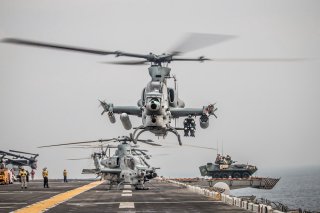American and Greek Forces Team Up for Annual ‘Alexander the Great’ Exercises
American and Greek forces just concluded their Alexander the Great 22 exercise, an annual amphibious training event that focuses on “battalion-level command and control and company-level combined arms training.”
American and Greek forces just concluded their Alexander the Great 22 exercise, an annual bilateral amphibious training event that focuses on “battalion-level command and control and company-level combined arms training.” Military exercises between the U.S. Navy, Marine Corps, and the Hellenic Armed Forces foster interoperability and cooperation.
“Alexander the Great was a tremendous success for the Marines of the 22nd Marine Expeditionary Unit,” said Lt. Col. Christopher Myette, executive officer of the 22nd MEU, in a U.S. Navy statement covering the exercise.
“The training we executed with our NATO Allies in Greece reinforced the close relationship between our two militaries and provided an outstanding opportunity to learn from each other and hone our warfighting skills in a first class training venue.”
The U.S. Navy statement explained that American and Greek forces conducted ship-to-shore operations as well as live-fire artillery events. “The 2nd Reconnaissance Battalion developed combined reconnaissance/sensing capabilities and staff functions; fulfilled the objectives outlined in the Line of Activity Strategy Implementation Summary,” the Navy said.
The U.S. Navy also explained that “employed combined reconnaissance forces in key maritime terrain [is used] to enhance maritime domain awareness (MDA). The bilateral training event also included an amphibious assault.”
Though the exercise occurred outside the auspices of NATO, it comes at a precarious time for European security. Russia’s ongoing invasion of Ukraine has injected a fresh concern for European security into European capitals and is the most significant foreign policy event of the last thirty years.
“The culminating amphibious assault was an awesome demonstration of the amount of combat power that can be rapidly projected ashore when combining the capabilities of the Hellenic Armed Forces and the Marines and Sailors of the ARG-MEU team,” said Lt. Col. Christopher Myette, executive officer of the 22nd Marine Expeditionary Unit.
“We thank our hosts from the 32nd Brigade of the Hellenic Marines for their tremendous hospitality, support and professionalism.”
Though the war in Ukraine has been primarily a battle for land and airspace, the Ukrainians have demonstrated a surprisingly potent anti-ship capability for a country without an effective naval fighting force. Moreover, lessons gleaned from Ukraine’s utilization of anti-ship munitions could aid the U.S. military and NATO allies.
With the United States poised to increase its troop presence in Europe to levels not seen since the end of the Cold War, any opportunity for collaboration and cooperation with the United States military, the bedrock of European security, is worthwhile for Greece and other American allies in Europe.
Caleb Larson is a multimedia journalist and defense writer with the National Interest. A graduate of UCLA, he also holds a Master of Public Policy and lives in Berlin. He covers the intersection of conflict, security, and technology, focusing on American foreign policy, European security, and German society for both print and radio. Follow him on Twitter @calebmlarson.
Image: Flickr .

